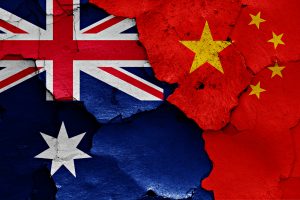Australia will join the United States in a diplomatic boycott of the Beijing Winter Olympics over human rights concerns, Prime Minister Scott Morrison said Wednesday.
As it did following the U.S. announcement on Tuesday, China responded furiously, saying no Australian officials had been invited to the Olympics and “no one would care about whether they come or not.”
Morrison said it should come as no surprise that Australian officials would boycott the event after the nation’s relationship with China had broken down in recent years.
“I’m doing it because it’s in Australia’s national interest,” Morrison said. “It’s the right thing to do.”
He said Australian athletes would still be able to compete.
As well as citing human rights abuses, Morrison said China had been very critical of Australia’s efforts to have a strong defense force in the region, “particularly in relation, most recently, to our decision to acquire nuclear-powered submarines.”
He said his government was very happy to talk to China about their differences.
“There’s been no obstacle to that occurring on our side, but the Chinese government has consistently not accepted those opportunities for us to meet,” Morrison said.
Rights groups have pushed for a full boycott of the games, including withdrawing the participation of athletes, accusing China of rights abuses against ethnic minorities. The U.S. and Australian decisions fall short of those calls but come at an exceptionally turbulent time for international relations and have been met with a barrage of criticism from China.
Chinese Foreign Ministry spokesperson Wang Wenbin denounced Morrison’s announcement as “political posturing,” but did not directly threaten the “resolute countermeasures” it vowed to exact on the U.S.
“China has not invited any Australian government officials to attend the Winter Olympics, and no one would care about whether they come or not,” Wang said at a daily briefing. “The Australian politicians’ political posturing and hyping for their own political interest have no impact whatsoever on the successful Beijing Olympic Games.”
Referring to the U.S., Wang said Australia was “blindly following certain countries in their steps to confuse right and wrong without a bottom line.”
The Australian Olympic Committee said the arrangements for the 40 or so Australian athletes expected to compete at the games would not be impacted by Morrison’s announcement.
“Getting the athletes to Beijing safely, competing safely and bringing them home safely remains our greatest challenge,” said Matt Carroll, the committee’s chief executive.
“Our Australian athletes have been training and competing with this Olympic dream for four years now and we are doing everything in our power to ensure we can help them succeed,” Carroll said in a statement.
New Zealand also said Tuesday it won’t be attending the games at a diplomatic level, but that it made the decision earlier due mostly to pandemic travel restrictions.
New Zealand told China in October about its plans not to send government ministers, Deputy Prime Minister Grant Robertson said. “There was a range of factors [behind the decision] but mostly to do with COVID, and the fact that the logistics of travel and so on around COVID are not conducive to that kind of trip,” he explained, as quoted by Reuters.
“But we’ve made clear to China on numerous occasions our concerns about human rights issues,” Robertson said.

































